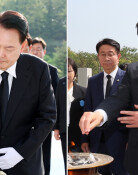End of Cold War in Northeast Asia?
An international symposium was held in Sapporo, Hokkaido of Japan, under the theme of Is Cold War Over in Northeast Asia? from June 25 to 27. The symposium, sponsored by the Hwajeong Peace Foundation of the Dong-A Ilbo and hosted by the Slavic Research Center of Hokkaido University, brought together some 60 researchers from South Korea, the United States, Russia, China, Japan and the United Kingdom.
The participants had in-depth discussions over various issues surrounding the Korean Peninsula, including the background of Russo-Chino intervention in the Korean War and the recent nuclear issue of North Korea.
▽ How China got involved in the Korean War
The prevailing view in the academic community about Chinas role in the Korean War has been that the country was reluctant to be involved. Mao Zedong, then chairman of the Community Party of China, was afraid of the U.S. intervention and unwilling to commit to military intervention without a military aid agreement from the then Soviet Union. When the troops of the United Nation and South Korea crossed over the 38th parallel, however, Mao was left with little option other than to send Chinese forces.
During the symposium, Zhihua Shen, professor of East China Normal University, and Chen Chien, professor of Cornell University of the United States, offered a new explanation on Chinese intervention in the inter-Korean war, based on confidential documents of the Communist Party of China and other newly discovered historical evidence.
China has already decided to send troops in July 1950, judging it was inevitable, they argued. China also anticipated that the United States would lead a landing operation in Incheon, a port city near Seoul, to recapture the lost capital city, and alerted Kim Il Sung, then North Korean leader.
They also argued that Kim Il Sung was caught off-guard when the United States came to the rescue of South Korea, and asked for help from the Soviet Union and China, citing the documented conversation between Kim and Terenty Shtykov, then Soviet ambassador to Pyongyang, which was reported to the general secretary of the Soviet Communist Party.
According to the report, Kim said to the ambassador in July and August of 1950, American bombing is annihilating the North Korean troops. The Soviet Union should dispatch military advisers, and China and Czechoslovakia should immediately send their troops, too.
In the report, Shtykov said, Kim Il Sung is greatly intimidated and in desperate need of air force aid from the Soviet Union and other socialist countries. Stalin, in response, directed to send military advisers disguised as correspondents of Pravda, an official organ of the Soviet Communist Party.
▽ Stalin provoked U.S. intervention? Unlikely
The participants agreed that Stalin was distrustful. When China declared that it would send troops to North Korea in early July 1950, he suspected that China was trying to enhance its influence over the peninsula. When Chinese intervention failed to produce satisfactory results in its early stage, he then feared that China`s Communist Party was pro-American. Against this backdrop, the participants all found it skeptical that Stalin provoked the U.S. intervention and Chinese involvement in anticipation of his own benefit. They emphasized that the U.S. intervention was an unexpected event for both Stalin and Mao Zedong.
Prior to the symposium, Kim Dong-gil, professor of history at Peking University, argued in his paper published on June 25 as part of the Cold War International History Project by the Woodrow Wilson International Center for Scholars that Stalin encouraged American and Chinese intervention in the Korean War. He based his argument on the telegram sent by Stalin to the president of Czechoslovakia in August 1950.
▽ Diplomatic relations between Pyongyang and Washington need cautious approach
Even though North Korea recently submitted its nuclear declaration to the United States and even volunteered to destroy the cooling tower at the Yongbyon nuclear facility, more participants in the symposium still called for cautious approach.
It is still to be seen whether the recent events will lead to complete denuclearization. The end of the Cold War in the Korean Peninsula will take its first step only when the nuclear issue of North Korea is completely resolved, said the participants.
When asked if North Korea and the United States will establish diplomatic relations before the end of President George W. Bushs term, the participants remained careful, saying it is too early to say and future developments should be carefully monitored.
myzodan@donga.com







